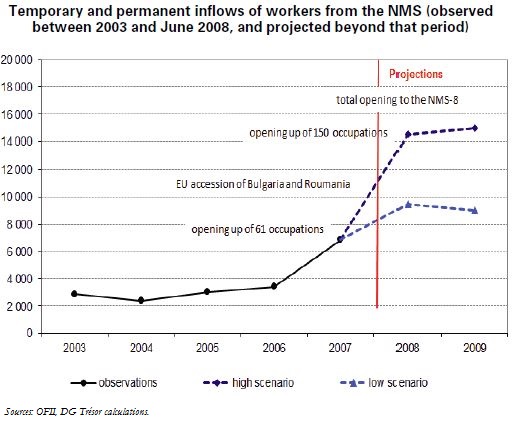Trésor-Economics No. 74 - The opening of France's labour market to new EU member states: an economic primer
As part of the enlargement of the European Union on 1 May 2004 and 1 January 2007, it was agreed that the fifteen existing member states could introduce transitional provisions to regulate the access of NMS citizens (but those of Cyprus and Malta) to their labour markets.
Like most of the "old" member states, France implimented these restrictions opening up gradually its labour market to citizens of these countries. These transitional regulations were ultimately discarded entirely on 1 July 2008 for the countries that joined EU in 2004, while continuing to prevail for Bulgaria and Romania.
Academical studies generally show that the economic benefits of immigration for the host country depend primarily on the "matching" between the qualifications of migrants and those of workers already present in the country. In this case, the particular characteristics of the citizens of the NMS have eased their integration into the labour market, since 40% of them are skilled manual workers, compared with 24% in the EU 15.
At the outset, French immigration policy toward the NMS was built around favouring a selective approach geared to the French economy's manpower requirements. France gradually opened up its labour market, based on a list of prevailing job vacancies and persistent recruitment difficulties.
Initial assessments show that labour market opening has been accompanied by a limited rise in migratory inflows from the NMS.
Following the complete opening up of the labour market to the countries that joined in 2004 coupled with the maintenance of a list of occupations for Bulgarian and Romanian citizens, our projections suggest that migratory flows from the NMS may have ranged between 9,000 and 15,000 entries in 2009. This figure is however uncertaint, since the economic downturn experienced over the period may have exert a downward pressure on migration flows over de last two years.
